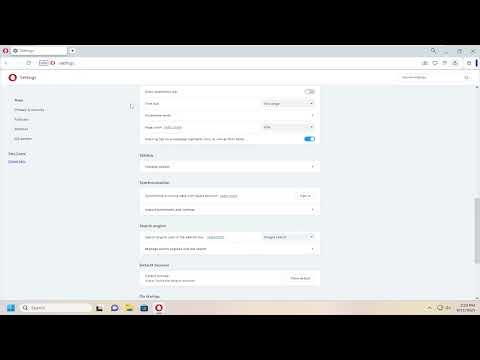When I first encountered the issue of changing the default search engine in my Opera browser, it was during a time of significant frustration. I had been using Opera for a while, and I was perfectly content with its features and performance. However, I recently started to feel that the default search engine wasn’t meeting my needs. It wasn’t that the search engine was inherently bad; it just wasn’t as effective for the type of searches I frequently perform. The default engine was good, but I needed something that could deliver more precise results based on my preferences. After doing some research, I discovered that changing the default search engine in Opera was a straightforward process, but it was one I had overlooked until then.
The problem first arose when I noticed that my search results were not as relevant or accurate as they used to be. I decided it was time to try a different search engine that might better suit my requirements. At first, I wasn’t sure how to go about making this change in Opera. I had always thought that such settings were deeply buried or difficult to access, and that was why I had never explored them before. It turned out that the process was much simpler than I anticipated.
To start with, I opened the Opera browser and looked for the menu icon, which is located in the top-left corner of the screen. Clicking on this icon brought up a sidebar with various options. From there, I selected “Settings,” which opened a new tab displaying a range of configuration options. I found this tab quite comprehensive, offering many settings that could be customized to fit my preferences.
Once I was in the Settings tab, I needed to locate the search engine settings. I scrolled through the available options and finally found the “Search Engine” section. This section was specifically designed for users who wanted to customize their search engine preferences. I clicked on this option, which took me to a screen displaying a list of available search engines.
Here, I saw that Opera had a few preset search engines, but I wanted to add a new one. To do this, I clicked on “Manage search engines,” which allowed me to see the full list of search engines currently available in my browser. At this point, I also saw an option to “Add” a new search engine, which was exactly what I needed.
When I clicked on “Add,” a form appeared asking for details about the new search engine I wanted to use. I had to enter a few key pieces of information, including the name of the search engine, the keyword (which is a short term I could use to quickly access this search engine from the address bar), and the URL. The URL required a specific format, which included a placeholder for the search query itself. This format was necessary for the search engine to properly understand and process my queries.
After entering all the required information, I clicked “Save” to add the new search engine to the list. With the new search engine now included, I needed to set it as my default. This was a simple matter of selecting the newly added search engine from the list and clicking “Set as default.” Immediately, Opera updated my search engine preferences, and the new search engine became my default option.
The entire process took only a few minutes, and I was relieved to see that Opera’s interface made it easy to customize my browsing experience. I had been concerned that changing the default search engine might be complicated or require advanced technical knowledge, but Opera’s user-friendly design made it much more accessible than I had imagined.
With the new search engine in place, I noticed a significant improvement in the quality of my search results. The new engine provided more relevant and accurate results based on my search queries. This change not only made my online research more efficient but also enhanced my overall browsing experience. It was a simple adjustment, but it had a substantial impact on how I interacted with the web.
In conclusion, changing the default search engine in Opera was a relatively easy task once I took the time to explore the browser’s settings. What initially seemed like a complex issue turned out to be a straightforward adjustment that significantly improved my search experience. If you find yourself in a similar situation, don’t hesitate to delve into your browser’s settings and make the changes that best suit your needs. It’s often the small adjustments that lead to the ultimate improvement in your online experience.
